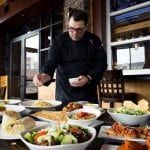This article is part of a series called “Getting Off-Premises”, which examines how to build an off-premises business.

By Jim Rand, catering practice leader
Catering practice leader Jim Rand visits Arthur “Sandy” McElfresh, Vice President of Catering at P.F. Chang’s. Sandy shares the powerful traits of great salespeople, who are crucial to growing a catering business.
TRANSCRIPT:
Jim Rand: A lot of restaurant organizations are going down the path of creating off-premises strategies and specifically off-premises catering strategies. Why do you think that having a catering sales team is an important part of that strategy?
Sandy McElfresh: Yeah, great question. There are a couple of reasons. One of the first mistakes I think that organizations make is they believe that because someone has occasionally asked them for catering, they have a catering business. That’s been totally reactive, and you need to get proactive in developing [that arm of business]. And [being] proactive means going out and finding the business. And that’s done through professional salespeople. It’s not done by somebody who is [primarily] running a restaurant and then occasionally has a few minutes [to] go out and meet a Chamber [of Commerce] member or something.
Jim Rand: Or drop off a basket of goodies.
Sandy McElfresh: Right, exactly.
Jim Rand: It’s much more than that.
Sandy McElfresh: It is a business-to-business relationship. Understanding what the sales process is.
Jim Rand: So when you build a catering sales team, what types of people do you look for, like traits and skills? And why?
Sandy McElfresh: It is a combination of maybe two sides of a coin. Skills can always be taught to someone who wants to learn, of course. It starts, though, with a little bit of DNA: Someone who has a drive in them, a competitiveness in them. Someone who can learn how to ask meaningful questions, [who] can listen effectively. [Someone who can] understand, through the answer that the client is giving, where are there demonstrable differences, so that they can continue to push through and get a sale. And then on the other side [of the coin: a salesperson] is someone who is willing to learn, right? Someone who can understand that there are skills that they need to develop. One of the challenges you’ve got on the restaurant side is that you’ve got people who just want to take a restaurant person and put them in sales without teaching them the [sales] skills, and without understanding whether or not they have that [sales] DNA.
Jim Rand: And I think one of the key things, too, is [that a salesperson] just can’t take no for an answer, right?
Sandy McElfresh: And “no” is just the beginning. If people [only] understood that the selling really only begins when the buyer says no. Then they start to understand what sales is. And I know lots of studies have been done about, you know, the average sale doesn’t come until someone said no to them six, seven, ten times.
Learn secrets to creating demand for your catering business.








